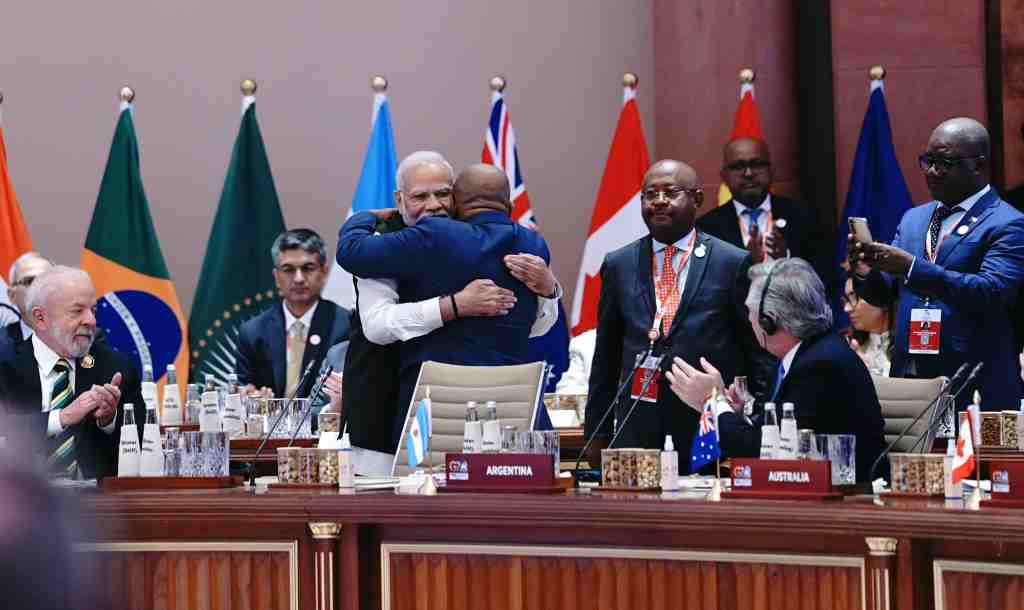During a concise televised inaugural session, Prime Minister Narendra Modi unveiled a historic decision, marking the African Union, comprised of 55 member states, as the first new addition to the G20 since its establishment in 1999, a period initially shaped by a series of financial crises.

The African Union has achieved a significant milestone by securing permanent membership status within the Group of 20, the world’s leading economies, as announced by Indian Prime Minister Narendra Modi during Saturday’s proceedings. This development adds substantial momentum to his efforts to amplify the representation of the Global South, particularly as he hosts this year’s annual summit.
Standing before the assembly, Modi’s nameplate bore the inscription ‘Bharat,’ an ancient Sanskrit name that holds significance among his Hindu nationalist supporters, in place of the more conventional ‘India.’
SHOCKING: Earthquake Horror Strikes Morocco! You Won’t Believe the Devastation!
This announcement coincides with the commencement of the G20 weekend summit, which unfolds against a backdrop of escalating global divisions and the conspicuous absence of key participants, potentially impeding consensus on the most challenging issues.
While the European Union had already secured its permanent membership in the G20, the move to add the African Union (AU) found overwhelming support among participants. During this momentous occasion, Indian Prime Minister Narendra Modi signaled this historic decision by rapping his gavel thrice, evoking a roomful of applause.
In a warm display of camaraderie, Modi extended a handshake and a heartfelt embrace to Comoros President Azali Assoumani, the current AU chair, before inviting him to join the table.
PM Modi said, “I invite the representative of the African Union to take his place as a permanent member of the G20.”
Monster Hurricane Lee Unleashes Fury: Unbelievable Category 5 Winds!
This action aligns with Modi’s overarching goal for this year’s summit: championing the voices of the Global South. Despite the world’s attention on the Russian-Ukraine conflict, India has been fervently striving to redirect focus toward addressing the pressing needs of developing nations, recognizing the interconnectivity of issues such as food and energy security with the European crisis.
As the summit unfolded, it became apparent that several G20 leaders were notably absent. Russia and China chose not to attend, avoiding potential confrontations with their American and European counterparts over various disputes, chiefly the Ukrainian conflict. Spain’s president was unable to participate due to COVID-19, and Mexico’s president also decided to forgo the event.
In the lead-up to this weekend’s summit, a series of preparatory meetings failed to yield consensus, primarily due to deepening divisions among the world’s major powers, primarily centered around the situation in Ukraine. The potential conclusion of the summit without a joint statement underscores the mounting strains in global relations, casting a shadow over India’s efforts to position itself as a global peacemaker.
First Lady Jill Biden Tests Positive for COVID-19 Ahead of President’s High-Stakes Summit
Upon their arrival in the Indian capital, participants were greeted by meticulously prepared streets devoid of traffic, adorned with vibrant floral displays and a multitude of posters adorned with slogans and the visage of Prime Minister Modi. Security measures were stringent, restricting both journalists and the public from proximity to the summit venue.
In addition to the groundbreaking inclusion of the African Union as a permanent member, the summit’s agenda featured pivotal topics crucial to the development of nations. These ranged from alternative energy sources like hydrogen and optimizing resource efficiency to forging a unified framework for digital public infrastructure and addressing the paramount issue of food security.
Furthermore, the participating nations aimed to tackle reforming international development institutions such as the World Bank and International Monetary Fund. These reforms aimed to enhance accessibility to funds for lower- and middle-income countries, facilitating their efforts to combat climate change and address various pressing global challenges.
